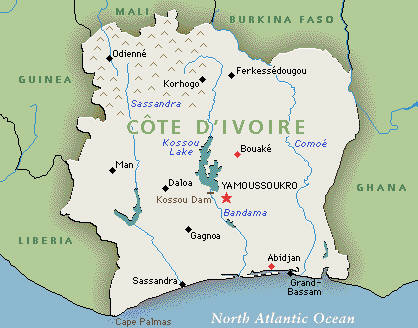
By Tamasin Ford
IT is early in the morning and the sun has only just risen.
Fighters from Ivory Coast’s former rebel group stand along a river bank watching, as hundreds of people packed onto rafts cross the river to reach the safety of Liberia. Just 50m of water separates Ivory Coast and Liberia at this crossing point. Throughout the night, sounds of gunfire echoed across the divide. Liberians woke to a rush of refugees scrambling over the river to escape what they fear most — a return to civil war. One of the men wearing army fatigues and a red beret talks on the phone as he shouts orders to people around him. He looks like he is the one in charge. Another with an AK-47 clasped in his hands stands nearby They both head towards a motorbike by the edge of the river bank where a fellow fighter, with a rocket-propelled grenade draped over his shoulder, waits to drive them. These men belong to the New Forces — the former rebel group from the north of Ivory Coast which is giving its backing to Alassane Ouattara, the man the UN says won November’s presidential elections. But incumbent President Laurent Gbagbo has refused to step down —splitting the country along the same north-south divide that the election was intended to heal. In 2002, the civil war left the rebels in charge of the north and the government army in control of the south. As the refugees arrive, they explain how the New Forces secured the village across the border from north-eastern Liberian town of Buutuo. One man says he saw the bodies of three government soldiers and so he fled with his entire family. The sounds of gunshots that morning were from the rebels, celebrating this small victory. People on the Liberian side of the river then say they recognise one of the fighters by name. “I served in the Liberia army before and I knew him then,” says an immigration official, pointing to the man with the red beret. “He was someone fighting as militia in the former regime of (Charles) Taylor.” There have been rumours of some Liberians crossing the border to fight, but until now, no-one has had evidence. Another Liberian looking on claims he went to school with the man, who later went on to be a commander in Taylor’s rebel National Patriotic Front of Liberia group. The man recently escaped from prison in the capital, Monrovia, where he had been convicted of rape. No-one knows how many Liberians have crossed the border to fight, but one man gave me a piece of paper with the names of three Liberians who he personally knew were involved. He said there have been promises of money and motorbikes to join either side in Ivory Coast. It is thought this number could rise to a quarter of a million over the next few months. Grago Malhn Michelle, a refugee from Bahieleu about 16km from the border, says he fled after an armed soldier came into his house. “While I was in the room he came to me with a gun and a knife in his hand. I blocked the knife and it gashed my hand. “These were government soldiers. There were no rebels in the village. After they did this to me, they took all my belongings and carried them. “They just came to harass me and take things from me. I never did anything.” Cecille Ougoun said she managed to grab only her children and their ID cards as she fled the Abobo area of the main city of Abidjan in the middle of the night. Using the back roads and walking through the forests, it took her more than a week to reach here. “They just forced the doors and entered to kill you,” she says. “You can’t identify them. They are all wearing plain clothes. “I saw too many dead bodies to count, dead bodies just everywhere. There were so many wounded.” It has rained heavily over the last few days and most of the refugees are sleeping out in the open. There are plans to move people to a newly built refugee camp about four hours away and further plans to start building more. Villages away from the border have also been chosen as host communities, where Ivorians will live with Liberian families. The government of Liberia, UN agencies and non-governmental organisations have begun mobilising food trucks. Drugs and extra manpower are being sent to clinics along the border, while lorries loaded with blankets, jerry cans and tarpaulins are trudging through the mud-clogged roads. People are working around the clock to try and avert a further crisis.— BBCOnline.











